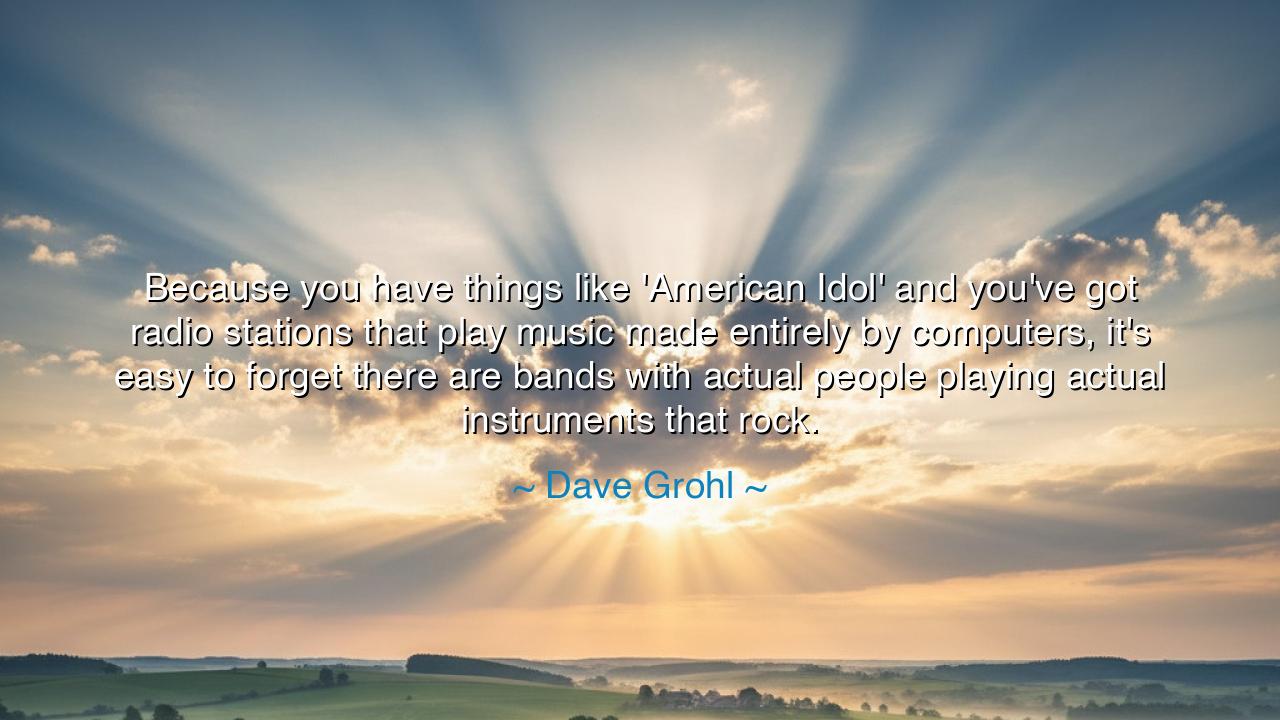
Because you have things like 'American Idol' and you've got radio
Because you have things like 'American Idol' and you've got radio stations that play music made entirely by computers, it's easy to forget there are bands with actual people playing actual instruments that rock.






In the ever-shifting landscape of modern entertainment, where the digital age has blurred the lines between authenticity and artifice, Dave Grohl’s words resonate deeply: "Because you have things like 'American Idol' and you've got radio stations that play music made entirely by computers, it's easy to forget there are bands with actual people playing actual instruments that rock." With these words, Grohl calls us to remember the rawness of human expression—the power of live performance, the soul that comes with imperfect creation, and the human touch that technology, despite its brilliance, can never fully replicate.
To understand the weight of Grohl’s statement, we must first look back to the ancient world, where music was a central part of human expression. In Greece, music was not just an art; it was an essential element of ritual and community. The lyre and the flute were instruments not simply for entertainment, but for invoking the gods and expressing the deepest of human emotions. The Greeks believed that music had the power to shape the very soul of a society, to bring people together in moments of celebration or mourning, and to connect them to the divine. Grohl’s words echo this sentiment—music is not simply a product to be consumed, but a living, breathing force that requires human hands, hearts, and minds to truly come alive.
The great Romans too, understood the profound power of live music. Nero, though infamous for his cruelty, was also known for his performances on the lyre, believing that his music had the power to sway the hearts of the people. Yet, in his desire to control and manipulate, he lost sight of the true essence of music—its authenticity. Grohl’s critique of a world filled with computer-generated music is a reminder that authentic expression is often lost in the pursuit of perfection and control. When music is shaped by algorithms rather than human creativity, it risks losing the soul and spontaneity that make it powerful.
Consider, too, the story of Beethoven, who, despite his hearing loss, continued to compose some of the most magnificent pieces of music ever written. His works, such as the Ninth Symphony, were not born from the machines of his time but from his own internal struggle, his own vision of what music could be. Beethoven’s compositions were a reflection of the human experience, raw and unfiltered by the constraints of technical perfection. In this light, Grohl’s statement serves as a reminder that the true power of music lies in its imperfections, in the passion of the musicians, and in the energy they bring to the stage. When that connection is lost, as it is in the world of computer-generated music, something vital is missing.
In medieval times, minstrels traveled from town to town, bringing the news and the story of the day through song. Their music was the living history of their time, shaped by the voices and hands of real people. These traveling musicians, though simple in their instruments and means, brought something far more important than just melodies—they brought human connection. In this way, Grohl’s words can be seen as a lament for a world where technology has taken over and human touch has been replaced by artificial perfection. There is a yearning in his words for a return to something real, something that can be felt in the gut—not just consumed passively through headphones, but experienced with the full force of human presence.
The lesson embedded in Grohl’s quote is not a condemnation of technology or the advancements in modern music production. Rather, it is a call to remember the importance of authenticity, the need for music to remain a living, breathing force that can still move us deeply, not just through its notes but through the sweat, the emotion, and the humanity of those who perform it. Just as the ancients recognized that music was the lifeblood of society, so too must we cherish the true spirit of music today. It is not enough for music to simply sound perfect; it must feel real, it must resonate with the human experience.
In our own lives, we must seek to embrace the authentic and genuine, to create not just for the sake of production but for the sake of expression. Whether we are musicians, artists, or simply individuals seeking to live meaningful lives, we must not forget that the true value of what we create lies not in perfection, but in the human connection we bring to it. Like Grohl’s call for bands with real instruments, let us strive to bring something genuine and alive to the world, something that carries the essence of our humanity. For in the end, it is the imperfections, the raw energy, and the real stories we tell through our work that will resonate with others and stand the test of time.






AAdministratorAdministrator
Welcome, honored guests. Please leave a comment, we will respond soon